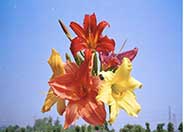
Common name:Daylily (hybrid selection)
Botanical name:Hemerocallis hybrids
These summer-blooming perennials form clumps with large, grass-like leaves. Its showy flowers, resembling lilies, are borne in clusters on stems held well above the foliage. Daylilies can be found in many colors: yellow, orange, red, purple, pink or multi-colored. Hemerocallis does better in well-draining soil and with extra summer water. Hemerocallis are very hardy,with few or none pests/problems.
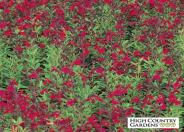
Common name:Furman's Red Texas Sage
Botanical name:Salvia greggii 'Furman's Red'
A Texas native but used in warm dry climates because of its reliability. 2005 Plant Select Winner. 24-36" tall x 18" wide. Furman's Red is one of the most cold hardy of the native Salvia greggii family. Blooming in late spring and again in the fall, the plant covers itself with bright red flowers that attract the hummingbirds from miles around. Sweetly aromatic foliage too. Drought resistant/drought tolerant plant when established. This is a wonderful selection, valued for its tightly branched, upright growth habit and profusion of dark red flowers beginning in early summer and continuing through the fall. Culturally undemanding, this plant tolerates a wide range of soils requiring only that they be quick draining. Just a bit of extra water during dry spells encourages more flowers. Although one of the most cold hardy Salvia greggii cultivars, it will occasionally freeze to the ground in Zone 6 areas. It will re-sprout quickly from the roots and crown to bloom on new wood that same year. This is a woody, evergreen shrub in mild winter climates.
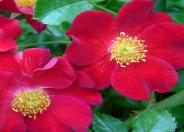
Common name:Red Flower Carpet Rose
Botanical name:Rosa Flower Carpet Red
Flower Carpet RED prefers hot warm conditions and just blooms and blooms and blooms. From mid-late Spring clusters of 25-30 of deep velvety deep-red single flowers appear all over the plant, accented by brilliant golden yellow stamens, sitting over deep glossy dark green foliage with a burgundy edge. And this show continues on until late Fall. Flower Carpet® RED has superlative disease-resistance to common rose blights such as black spot and mildew.
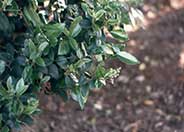
Common name:Waxleaf Privet
Botanical name:Ligustrum japonicum 'Texanum'
This dense evergreen shrub of an upright habit is capable of growing as a shrub or small tree. Its dark green, leathery leaves are opposite those of a simple evergreen plant.
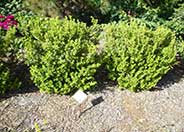
Common name:Japanese Boxwood
Botanical name:Buxus microphylla japonica
Japanese Boxwood is often used as a hedge. It is compact, with small bright green leaves. It can reach 4'-6' tall and wide or be kept smaller through pruning. It can be sheared to shape. It does better in areas with milder winters.
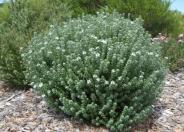
Common name:Coast Rosemary
Botanical name:Westringia fru. 'Grey Box'
A true dwarf coastal rosemary selection that has a natural box shape and beautiful gray-green foliage which makes this Westringia far different than any other we have seen. Perfect for a hedge or group planting in pocket gardens and home gardens, yet tough enough for commercial applications as well! Grey Box seems to work well in both arid and humid Zones 9-11 climates. So while Westringia are best suited to Mediterranean climates, Grey Box has continued to perform very well in subtropical climates, provided it is planted in a raised bed and free-draining soil and is watered infrequently (and best when irrigated via drip irrigation).
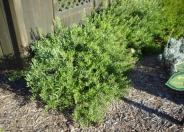
Common name:Little Ollie Dwarf Olive
Botanical name:Olea europaea 'Little Ollie'
This evergreen shrub will grow to 8' tall and wide. It doesn't produce any fruit. It will do well in hot dry areas but can also survive in coastal areas. It has a compact round habit making it great for borders. It can be used for bonsai. It prefers well draining soil and is drought tolerant once it's established.
Designer: Armstrong Nursery
Photographer: GardenSoft
Incorporate compost 6" into your soil to retain water, reduce compaction, feed earthworms, and provide valuable nutrients to your plants.
Drip and other smart irrigation delivers water directly to roots, allowing no excess water for weeds.